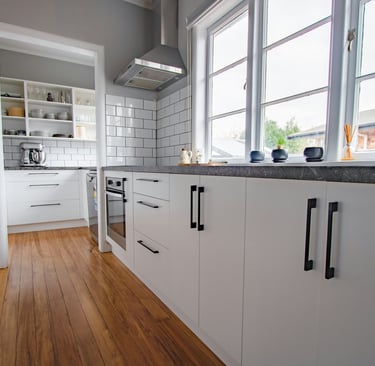5 Best Eco-Friendly Flooring Options for a Kitchen Remodel
1/11/20253 min read
Our 5 Top Flooring Picks for Your Sustainable Kitchen Remodel
It's important for your chosen flooring to not only be resilient and maintainable but also reflect eco-friendliness in its attributes. Thankfully, there exists myriad green-flooring alternatives that are as pleasing visually as they are kind to Mother Nature by reducing carbon footprints. This piece will delve into unveiling the best sustainable flooring options fit for revitalizing your cooking hub.
Why Choose Eco-Friendly Flooring
Before diving into the various eco friendly flooring options available, let's understand why choosing eco-friendly materials for your kitchen remodel is essential.
1. Sustainability
Green-friendly flooring supplies usually come from renewable sources which means manufacturing them doesn't exhaust natural resources or damage our world environment. Making an environmentally friendly choice for your floor covering helps in conserving sensitive ecosystems on Earth.
2. Indoor Air Quality
Many conventional flooring elements can discharge volatile organic compounds (VOCs) and various harmful substances that degrade indoor air quality negatively. Healthy alternatives using earth-conscious products are generally low-VOC contributors, paving way to better living conditions indoors.
3. Longevity
These supportive-of-mother-nature floors also focus on being durable, thus maintaining their original form longer, and decreasing frequency of reinstatement – all while saving money and preventing unnecessary waste generation.
4. Aesthetics
Eco-conscious options have significantly evolved with design aesthetics together over time. They now offer comprehensive color schemes and diverse motifs along with subtle textures that uplift aesthetic appeal across kitchens.
5 Best Eco-Friendly Flooring Options for a Kitchen Remodel
Now that we understand the benefits of eco-friendly flooring, let's explore some of the best options for your kitchen remodel:
1. Bamboo Flooring
Bamboo is often regarded as one of the greenest flooring options available. It's a fast-growing grass that can be harvested without destroying the plant’s integrity. Let’s understand why bamboo floors could be an excellent fit for your cooking area:
Replenishable: The relatively brief maturity duration of a few years renders bamboo highly restock-able.
Toughness: Enduring and resistant characteristics make bamboo floors ideal for bustling places such as kitchens.
Visual charm: You have numerous styles and shades at disposal to craft desired ambiance.
Reduced VOCs: Compared with conventional hardwood options, bamboo flooring typically vents fewer volatile organic compounds, which underscores its eco-friendliness.
2. Cork Flooring
Produced from the bark of cork oak trees, cork flooring is an amazing green alternative for your kitchen and here's why:
Conservation: The extraction process involves removing the outer cover of cork oaks without causing harm to these natural beings.
Comfort: With its inherent softness, it makes standing a pleasure in kitchens where long durations at stretch are common.
Thermal efficiency: Cork disposes excellent heat retentive abilities which ensure that your cooking space remains warm thereby decreasing heating expenses.
Allergen-free: Its resistance towards mold formation along with repellency against insects promotes this as an ideal choice for those prone to allergies.
3. Linoleum Flooring
Linoleum and vinyl are frequently mistaken for each other despite being completely distinct materials. With that said, linoleum flooring offers several eco-friendly advantages:
Natural Ingredients: Linoleum's composition includes renewable ingredients like cork dust, wood flour, and most notably, linseed oil.
Biodegradable: Since it degrades naturally over time, once its use has been fully maximized, you won't find it clogging your landfills in the long run.
Durability: Renowned for longevity and tolerance to rough usage without significant damage lends a note to why many choose this material.
Low Maintenance: One major plus point falls on how one can effortlessly clean this surface–a key characteristic especially when factoring in kitchen spaces.
4. Reclaimed Hardwood Flooring
If you love the look of hardwood floors, consider using reclaimed hardwood for your kitchen remodel. Reclaimed hardwood is salvaged from old buildings and repurposed for new projects. Here are some reasons to consider this option:
Sustainability: Reclaimed hardwood reduces the demand for new trees to be cut down.
Character: Each piece of reclaimed wood tells a unique story, adding character and history to your kitchen.
Durability: Hardwood is known for its longevity, and reclaimed hardwood is no exception.
Timelessness: Hardwood floors never go out of style and can complement various kitchen designs.
5. Recycled Glass Tiles
Looking to reinvent your kitchen floor with a touch of novelty and environmental responsibility? Look no further than recycled glass tiles. These tiles are made from repurposed glass bottles, along with other forms of salvaged glass materials which come bearing numerous benefits:
Sustainability: The reuse aspect cuts down demands for fresh raw resources hence mitigating waste.
Variety: Recycled glass tiles come in a wide range of colors and sizes, allowing for creative designs.
Durability: Their resistance to stains coupled with easy cleaning attributes make them long-lasting additions.
Reflective Properties: Given their ability to echo light off the surface, they enhance the luminescence in your culinary space effortlessly.
Conclusion
Eco-friendly flooring is a great option for a kitchen remodel without compromising on design or performance. Many eco-friendly materials, from bamboo and cork to reclaimed hardwood and recycled glass, may improve your kitchen's aesthetics and performance while lowering your carbon footprint.


Explore
Welcome to Stay Curious – the blog where questions never get old and answers are always a little bit unexpected. Here, we challenge the status quo, dig into the weird and wonderful, and offer insights that might just make you think, “Why didn’t I know this sooner?”
From quirky facts to deep dives into the everyday mysteries of life, we’re all about satisfying that itch for knowledge you didn’t even know you had.
So, go ahead—stay curious. We promise it’ll be worth your while. Or, you know, not.
Contribute
Learn
ask.staycurious@gmail.com
© 2025. All rights reserved.
We welcome guest posts on business, tech, travel, finance, lifestyle, career, relocation, and home improvement. Submissions must be original, unpublished (online), at least 800 words, and written in English.
Ready to contribute? Contact us with your ideas!
